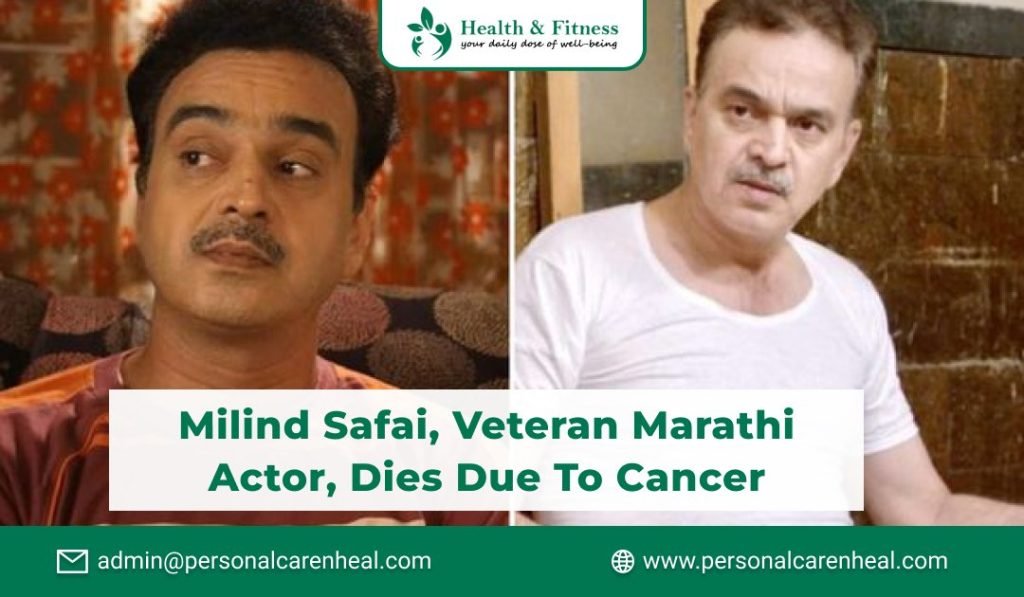Veteran Marathi actor Milind Safai passed away due to cancer. He worked on the TV show ‘Aai Kuthe Kay Karte’ for two episodes, but later he didn’t appear in the TV serial. According to reports, he was diagnosed with cancer and he quit working on the show because of his health issues. He had been struggling with cancer for the last couple of months and died today (August 25).
He has been undergoing treatment for some time for cancer. He played the role of Madhurani Prabhulkar’s on-screen father in the TV serial ‘Aai Kuthe Kay Karte’ and he worked in the show for a few episodes.
He worked in many films and serials. Apart from the Marathi film industry, he also worked in Hindi cinema. He worked in Marathi movies like Thank Vitthala, Premachi Josht, Lockdown, Poster Boys, and Be Positive. Apart from movies, he also worked in ‘Sang Tu Aahes Ka’, ‘100 Days’, ‘Aashirwad Tuja Ekvira Ai’, and more.
On Facebook, director Sachin Goswami announced Milind’s demise. The director of Maharashtrachi Hasya Jatra posted a picture of Milind along with the Marathi caption, “Actor Milind Safai. He died… sadly…. awful news A sincere tribute.”
What is a Cancer?
Cancerous cells usually multiply uncontrollably. It can result in tumours and can cause damage to the immune system and other body parts that can be fatal. Basically, cancer describes the disease that results when there is uncontrollable growth of cells. Certain forms of cancer can lead to visible growths known as tumours.
Most of the cells of the body have specific time periods or lifespans. Cell death is called apoptosis. A cell gets the instruction to die so that the body can replace it with a new cell that would work better. Cancerous cells lack the aspects that instruct them to stop multiplying and to die. As a result, they grow in the body, using nutrients and oxygen. Cancerous cells can turn into tumours and weaken the immune system.
Causes of Cancer
There are many reasons behind cancer and some can be prevented. Apart from smoking, there are several risk factors associated with cancer, such as:
• heavy alcohol consumption
• excess body weight
• physical inactivity
• poor nutrition
Possible Treatment Options for Cancer
Doctors suggest treatment options according to the cancer type, its stage, and overall health. The following are some approaches used to treat cancer:
• Chemotherapy is helpful in destroying cancerous cells with medications. The drug can also shrink tumours, but it can lead to some side effects.
• Hormone therapy uses medications that change the working of certain hormones or interfere with the ability of the body to produce them.
• Immunotherapy involves taking medications and other treatment options to enhance the immune system and help it fight against cancerous cells.
• To kill cancerous cells, radiation therapy uses high-dose radiation. In addition to this, the doctor may suggest using radiation to shrink a tumour prior to surgery.
• A stem cell transplant is helpful for those with blood-related cancers, such as lymphoma or leukaemia. It is helpful in removing cells that radiation or chemotherapy has killed. Lab technicians strengthen the cells and again put them back into the body.
• Surgery is a part of treatment. A surgeon may remove lymph nodes to prevent or reduce the disease’s spread.
Types of Cancer
The name of the cancer is given to a body part in which it begins. For instance, if a cancer develops in the lung and spreads to the liver, then it will be known as lung cancer. The following are different types of cancer:
• appendix cancer
• bladder cancer
• bone cancer
• breast cancer
• brain cancer
• colon or colorectal cancer
• cervical cancer
• duodenal cancer
• ear cancer
• endometrial cancer
• esophageal cancer
• heart cancer
• gallbladder cancer
• kidney or renal cancer
• laryngeal cancer
• lip cancer
• lymphoma
• leukemia
• liver cancer
• lung cancer
• myeloma
• mesothelioma
• ovarian cancer
• oral cancers
• pancreatic cancer
• penile cancer
• prostate cancer
• rectal cancer
• small intestine cancer
• skin cancer
• spleen cancer
• stomach or gastric cancer
• testicular cancer
• thyroid cancer
• uterine cancer
• vaginal cancer
• vulvar cancer
Conclusion
Cancer has uncontrolled cell division as one of its symptoms. Additionally, it prevents them from dying when their life cycle should have begun. Smoking is only one example of a lifestyle choice that may influence how the condition develops. Numerous factors affect how DNA interacts with cells and regulates their division and demise. You can also subscribe Personal Care N Heal for more details on fitness and health.



